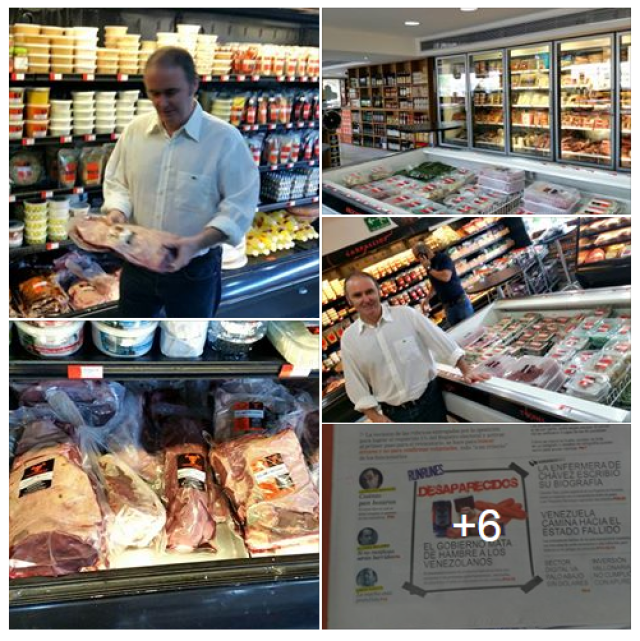
Agustin Otxotorena, a Basque executive living in Caracas, grew tired of constant calls from friends and relatives in Spain telling him that there was no food in Venezuela. So on May 20, he began publishing photos on Facebook of supermarkets in upscale sectors of Caracas filled with goods.
As well as showing evidence of an abundance of food stuffs, Otxotorena also analysed the situation. He concluded that there are two countries in Venezuela — one where “there are many people having a hard time, who don't have the money to live,” and another where there is “an upper class that has a living standard higher than Europe”.
“If you have money there is champagne … vodka, Belgian chocolates … lobster, brand-name clothes, exclusive restaurants … nightclubs, beaches … yachts, golf clubs — a whole country within a country where there are no poor, women and children are blond, go to exclusive schools, exclusive universities, and vacations, where Blacks or poor are the waiters,” he posted on his Facebook page.
He said that this phenomenon stems from corruption in import processes, subsidies by the government, and the existence of buying, re-selling and smuggling of subsidised essential goods by “bachaqueros”, linked to Colombian paramilitary groups.
He explained that large retail chains such as Makro, Excelsior Gama or Plaza's have their own import mechanisms: “They import directly and work with the strongest private importers.”
These chains are then able to set their own prices to the value of the dollar. They are not regulated by the government.
All other shops must turn to wholesalers and small importers, which are regulated and distributed by the left-wing government, and sold at subsidised prices. The basic basket products are regulated in bolivars at very low prices and are accessible to the working class.
Otxotorena said: “While oil prices held, the Venezuelan government brought food in and everything, and gave dollars to importers, who basically defrauded the government by putting premiums in dollars and a thousand ways and means, corrupting officials to certify, for example, that they had brought in three containers of auto parts … when they had only brought one in and passed it through customs three times.”
When the Venezuelan government closed the border with Colombia last year, the bachaqueros began to buy subsidised commodities to re-sell to Venezuelans and to take out of the country.
He added that these bachaqueros are directed and controlled by Colombian mafia groups — with the complacency, at least, of Venezuela's right-wing opposition. They have made a career of standing in lines to buy, hoard, re-sell and smuggle goods out of the country.
This has lead to the lack of foodstuffs in working class and poor neighbourhoods. It is estimated that 40% of these products are taken out of the country to be sold.
Colombian paramilitaries earn more money from these Venezuelan goods than from the production and marketing of cocaine, Otxotorena added.
Otxotorena's conclusion is that there is a war against the Venezuelan people. Its criminal and coup-plotting character is encouraged by some international media “that would not bear or endure a 10th of these behaviours if they occurred in their countries”.
“Everything goes toward the overthrow of Chavismo. However, whatever, whenever … The only thing that matters to [the opposition], even if the country is destroyed, is to get the Blacks, the poor, the Indigenous, the 'ugly people' or 'peasants' out of power.
“Unfortunately, they are very racist and classist.”
[Slightly abridged from TeleSUR English.]
Like the article? Subscribe to Green Left now! You can also like us on Facebook and follow us on Twitter.